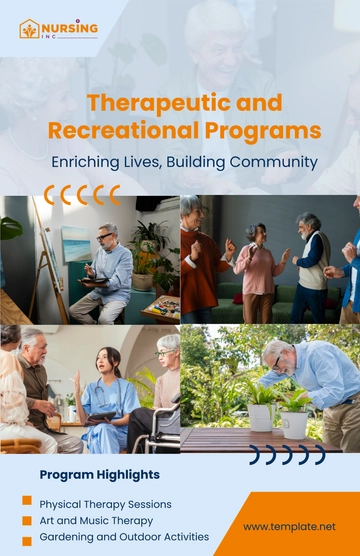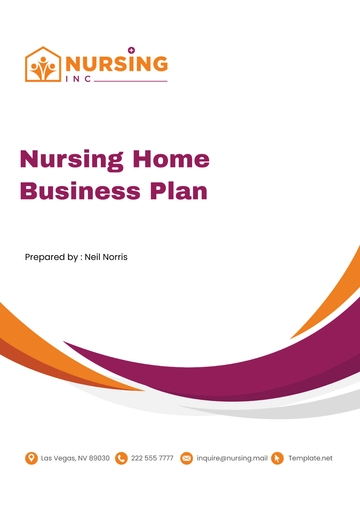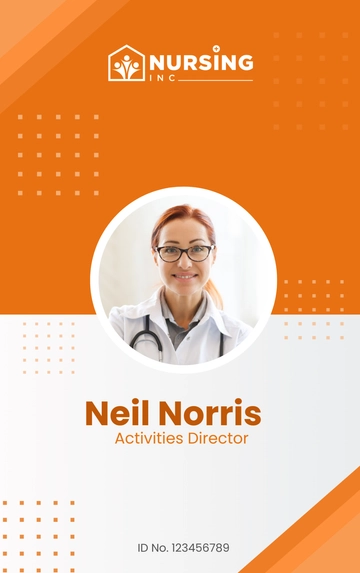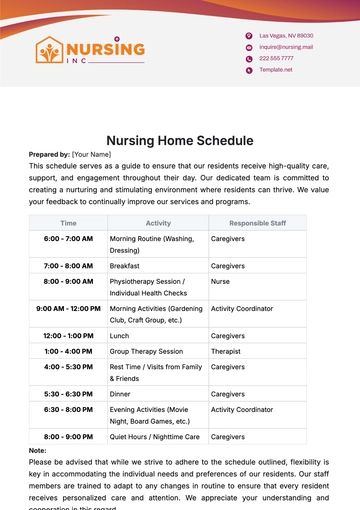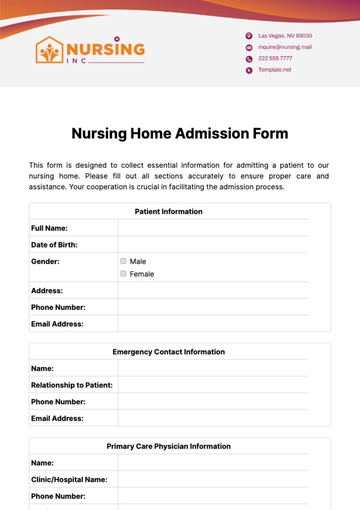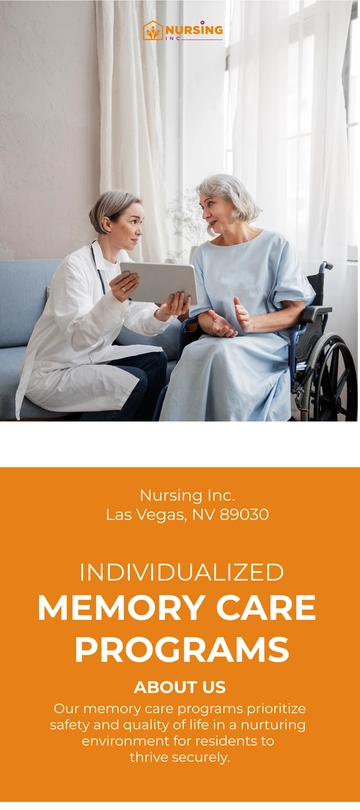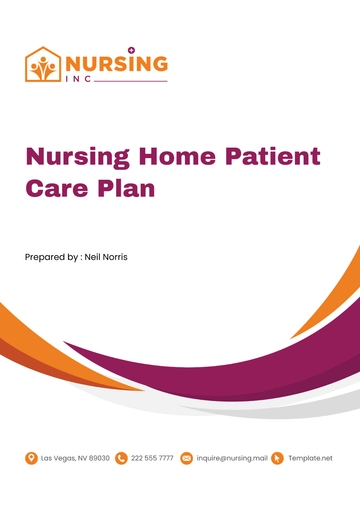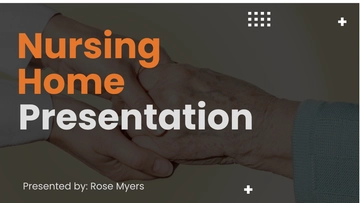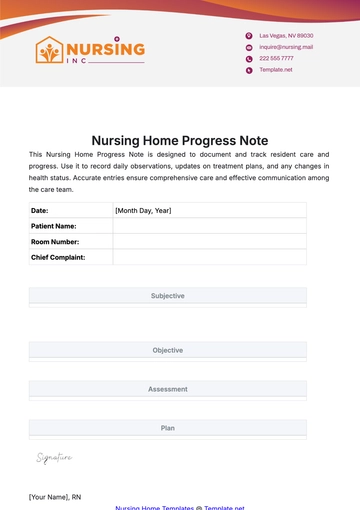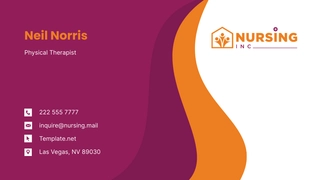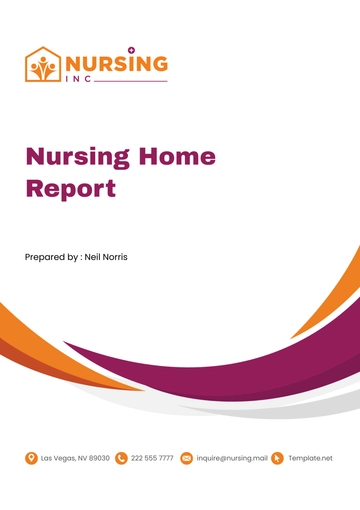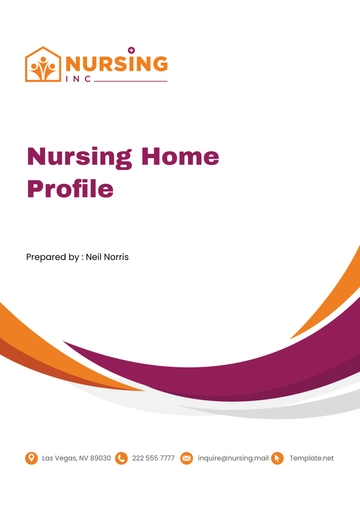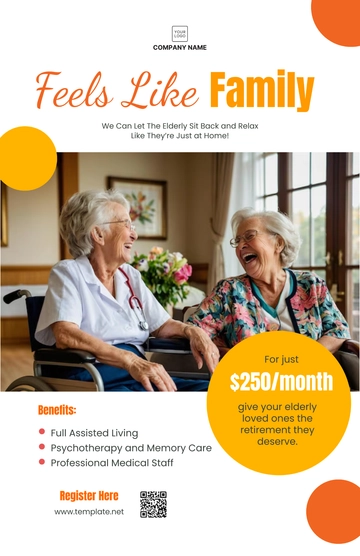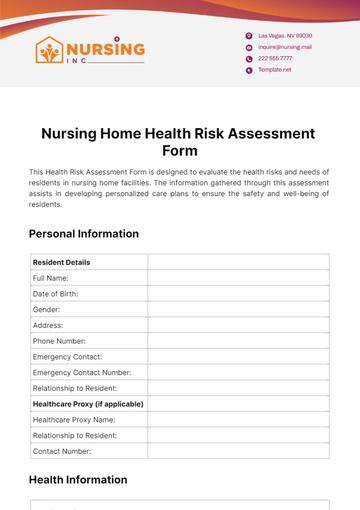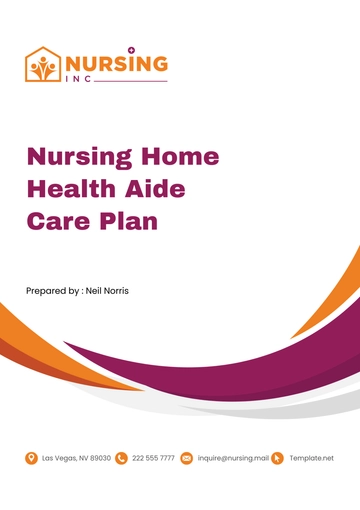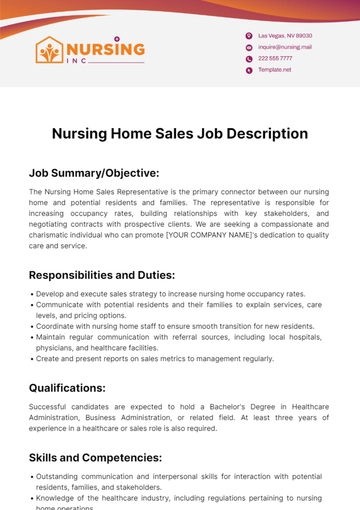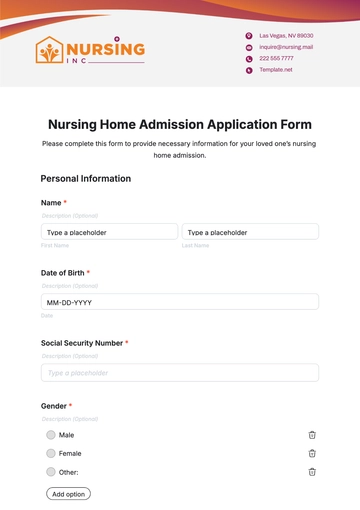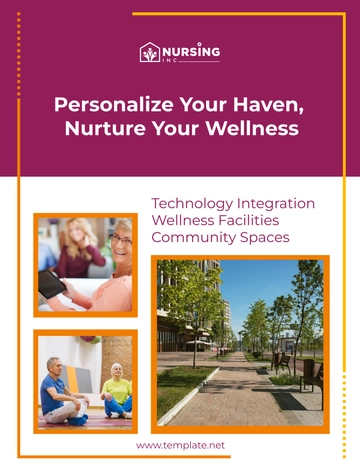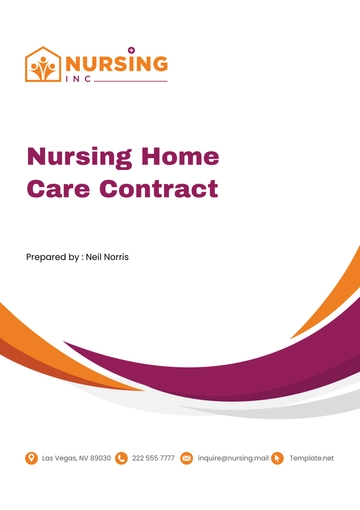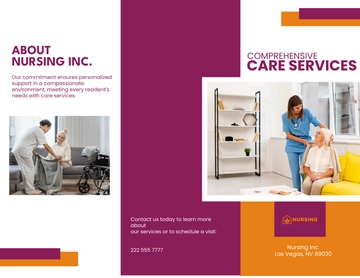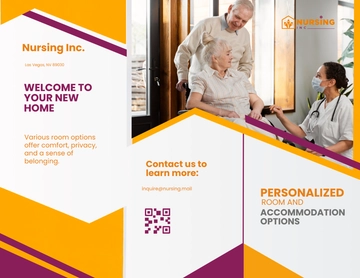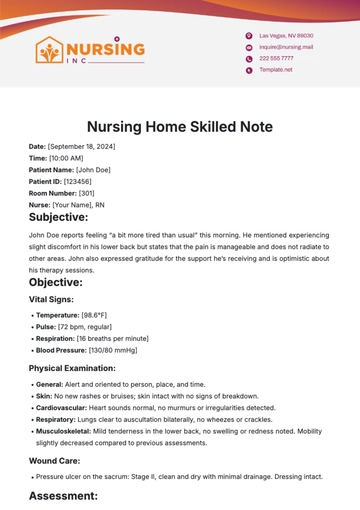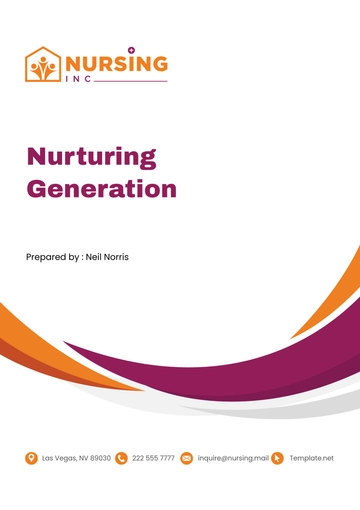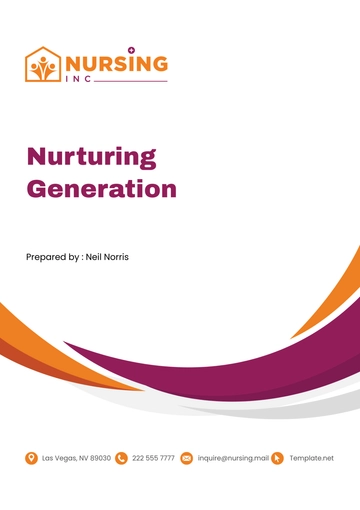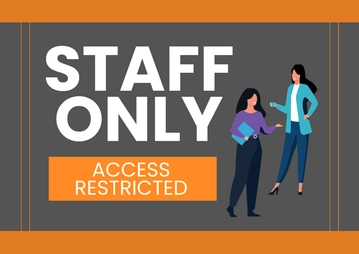Free Nursing Home Comprehensive Facility Management Guide
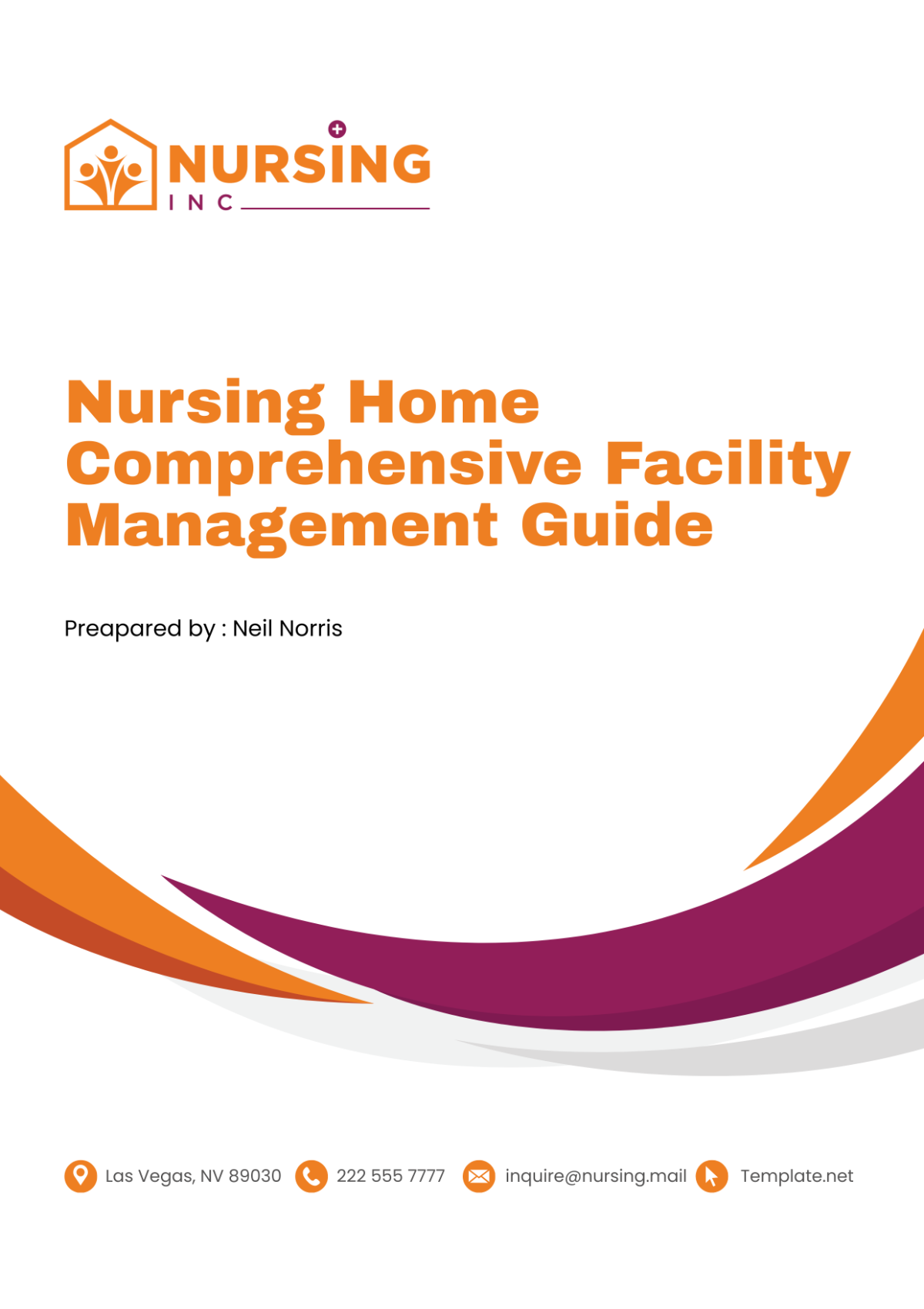
I. Introduction
Welcome to [Your Company Name] Comprehensive Facility Management Guide. This guide serves as a comprehensive resource for our administrators, managers, and staff members to effectively manage our nursing home facility and provide exceptional care to our residents.
II. Regulatory Compliance
Ensuring compliance with state and federal regulations is paramount in providing quality care. [Your Company Name] adheres to regulations set forth by various governing bodies, including:
Centers for Medicare & Medicaid Services (CMS): CMS sets and enforces standards for healthcare facilities participating in Medicare and Medicaid programs to ensure quality care for beneficiaries.
State Department of Health: State health departments regulate healthcare facilities within their jurisdiction to safeguard public health and ensure compliance with state-specific regulations.
Occupational Safety and Health Administration (OSHA): OSHA establishes and enforces workplace safety standards to protect employees from hazards and ensure a safe working environment.
The Joint Commission: The Joint Commission accredits and certifies healthcare organizations based on rigorous quality and performance standards to promote patient safety and quality of care.
Health Insurance Portability and Accountability Act (HIPAA): HIPAA protects the privacy and security of individuals' health information and establishes standards for the electronic exchange of healthcare data.
III. Staffing
Staffing is a cornerstone of delivering quality care at [Your Company Name]. We prioritize the recruitment, training, and retention of skilled professionals across various roles to ensure our residents receive the highest standard of care.
A. Recruitment Strategies
Targeted Recruitment: We employ targeted recruitment strategies to attract qualified candidates, leveraging online job boards, professional networks, and local community outreach programs.
Collaborative Partnerships: We establish collaborative partnerships with nursing schools, vocational training programs, and job placement agencies to identify and recruit talented individuals entering the healthcare field.
Competitive Compensation: [Your Company Name] offers competitive compensation packages, including salary, benefits, and incentives, to attract top talent and retain dedicated staff members.
B. Training and Development
Comprehensive Onboarding: We provide comprehensive onboarding programs to equip new hires with the knowledge and skills necessary to excel in their roles, including orientation sessions, job shadowing opportunities, and mentorship programs.
Continuing Education: We support ongoing professional development through continuing education initiatives, workshops, seminars, and tuition reimbursement programs to empower staff members to expand their knowledge and enhance their skills.
Specialty Training: [Your Company Name] offers specialized training programs for staff members working in areas such as dementia care, rehabilitation therapy, wound management, and palliative care to ensure our team is equipped to meet the diverse needs of our residents.
C. Retention Strategies
Supportive Work Environment: We foster a supportive work environment that values and respects the contributions of all staff members, promoting open communication, recognition programs, and opportunities for professional growth and advancement.
Work-Life Balance: [Your Company Name] prioritizes work-life balance by offering flexible scheduling options, paid time off, and wellness programs to support the physical and emotional well-being of our staff.
Employee Engagement: We actively engage staff members in decision-making processes, soliciting feedback, and implementing suggestions to improve workplace satisfaction and employee morale.
D. Diversity and Inclusion
Diversity Initiatives: [Your Company Name] is committed to promoting diversity and inclusion within our workforce, implementing recruitment strategies and training programs that celebrate and embrace the unique backgrounds, perspectives, and talents of our staff members.
Cultural Competency Training: We provide cultural competency training to enhance staff members' understanding and sensitivity to the diverse needs and preferences of our resident population, fostering an inclusive and welcoming environment for all.
E. Staffing Ratios and Workload Management
Optimal Staffing Ratios: [Your Company Name] maintains optimal staffing ratios based on industry standards and resident acuity levels to ensure that our residents receive individualized attention and care.
Workload Management: We employ workload management strategies, such as scheduling software, task delegation, and cross-training initiatives, to effectively distribute responsibilities and prevent burnout among our staff members.
IV. Resident Care
At [Your Company Name], we are dedicated to providing personalized and compassionate care that enhances the quality of life for our residents. Our resident care practices encompass a comprehensive approach that addresses the physical, emotional, and social needs of each individual.
A. Assessment and Care Planning
Initial Assessment: Conducted upon admission, this assessment evaluates the resident's medical history, current health status, functional abilities, cognitive function, and psychosocial needs to develop a comprehensive care plan.
Ongoing Assessments: Regular assessments are conducted to monitor changes in the resident's condition, evaluate the effectiveness of interventions, and update the care plan as needed to ensure it remains tailored to the resident's evolving needs.
Family Consultation: Involving family members in the care planning process ensures their input and preferences are considered, fostering collaboration and shared decision-making to provide the best possible care for the resident.
Multidisciplinary Collaboration: Our interdisciplinary team, including nurses, therapists, social workers, and physicians, collaborates to develop and implement the care plan, bringing together diverse perspectives and expertise to optimize resident outcomes.
B. Medical Management
Medication Administration: Our licensed nurses oversee the accurate administration of medications, monitor for potential interactions or side effects, and educate residents and families about medication regimens to promote adherence and safety.
Physician Oversight: Our healthcare team works closely with residents' physicians to coordinate medical care, review treatment plans, and address any changes in health status or medication needs promptly and effectively.
Laboratory and Diagnostic Testing: We facilitate laboratory tests and diagnostic procedures as ordered by physicians, ensuring timely and accurate results to inform medical management decisions and monitor the resident's health status.
Chronic Disease Monitoring: Residents with chronic medical conditions, such as diabetes, hypertension, or heart disease, receive ongoing monitoring and management to optimize disease control, prevent complications, and enhance overall health and well-being.
Pain Management: Our healthcare team assesses and manages residents' pain using a multidimensional approach that may include medication, physical therapy, complementary therapies, and psychosocial support to alleviate discomfort and improve quality of life.
C. Nursing Care
Wound Care: Our skilled nurses assess and dress wounds, monitor healing progress, and implement evidence-based interventions to prevent infection and promote tissue repair for residents with acute or chronic wounds.
IV Therapy: Residents requiring intravenous medications or fluids receive skilled nursing care for IV insertion, monitoring, and maintenance to ensure proper hydration, medication delivery, and treatment efficacy.
Catheter Care: Our nursing staff provides comprehensive care for residents with indwelling urinary catheters, including proper insertion, maintenance, and monitoring to minimize the risk of infection and urinary complications.
Respiratory Care: Residents with respiratory conditions, such as COPD or pneumonia, receive specialized nursing care, including oxygen therapy, nebulizer treatments, and respiratory assessments to optimize lung function and comfort.
D. Rehabilitation Services
Physical Therapy: Our licensed physical therapists develop personalized exercise programs, gait training, and mobility exercises to improve strength, balance, and mobility for residents recovering from surgery, injury, or illness.
Occupational Therapy: Our occupational therapists focus on enhancing residents' ability to perform activities of daily living, such as dressing, grooming, and meal preparation, through adaptive techniques, assistive devices, and environmental modifications.
Speech Therapy: Residents with communication or swallowing difficulties receive specialized speech therapy services to improve speech articulation, language comprehension, and swallowing function, promoting independence and quality of life.
Balance and Fall Prevention: Our rehabilitation team conducts assessments to identify residents at risk for falls, implements targeted interventions to improve balance and stability, and educates residents and staff on fall prevention strategies to enhance safety.
Cognitive Rehabilitation: Residents with cognitive impairments, such as dementia or stroke-related deficits, participate in cognitive rehabilitation programs focused on memory enhancement, problem-solving skills, and functional independence to maximize cognitive function and quality of life.
Activities of Daily Living (ADL) Training: Our therapists provide training and support to help residents regain or maintain independence in essential activities of daily living, such as bathing, dressing, toileting, and meal preparation, promoting self-care and autonomy.
E. Psychosocial Support
Emotional Counseling: Our licensed social workers provide individual and group counseling sessions to address residents' emotional concerns, coping strategies, and adjustment to life changes, offering support and guidance in navigating challenging emotions.
Support Groups: Residents have the opportunity to participate in support groups facilitated by trained professionals, where they can connect with peers facing similar challenges, share experiences, and receive encouragement and validation in a supportive environment.
Therapeutic Activities: We offer a variety of therapeutic activities and recreational programs tailored to residents' interests and abilities, including art therapy, music therapy, pet therapy, and reminiscence groups, promoting socialization, self-expression, and emotional well-being.
F. End-of-Life Care
Palliative Care: Our interdisciplinary team provides palliative care services focused on symptom management, comfort, and quality of life for residents with advanced illness or life-limiting conditions, emphasizing dignity, respect, and compassionate support for residents and their families.
Advance Care Planning: We facilitate advance care planning discussions with residents and their families to document their preferences and goals of care, ensuring that their wishes are honored and respected throughout their end-of-life journey.
Spiritual Support: Our chaplains and spiritual care providers offer spiritual support and guidance to residents and their families, providing comfort, solace, and a sense of peace during times of spiritual distress or existential questioning.
Bereavement Support: Following the loss of a resident, we offer bereavement support services to grieving families, including counseling, support groups, and memorial services, honoring the memory of their loved one and providing ongoing support during the grieving process.
V. Facility Maintenance
Maintaining a safe, comfortable, and well-functioning environment is essential for the well-being of our residents and the efficiency of our operations at [Your Company Name]. Our facility maintenance practices encompass a range of areas to ensure the physical infrastructure meets high standards of quality and safety.
A. Building Upkeep
Routine Inspections: Our maintenance team conducts regular inspections of the facility to identify and address any maintenance issues promptly, including plumbing leaks, electrical malfunctions, and structural concerns.
Preventive Maintenance: We implement preventive maintenance schedules for essential building systems and equipment, such as HVAC systems, elevators, fire alarms, and emergency generators, to minimize downtime and prolong their lifespan.
Repair and Renovation Projects: We prioritize timely repair and renovation projects to address wear and tear, update outdated facilities, and enhance the overall aesthetics and functionality of our environment for the benefit of our residents and staff.
B. Environmental Safety
Hazard Identification: We proactively identify potential safety hazards within the facility, such as slippery floors, loose handrails, or inadequate lighting, and take corrective actions to mitigate risks and prevent accidents or injuries.
Emergency Preparedness: [Your Company Name] maintains emergency preparedness plans and protocols to respond effectively to natural disasters, fires, medical emergencies, and other crisis situations, ensuring the safety and well-being of residents and staff.
Accessibility Compliance: We ensure that our facility complies with accessibility standards outlined in the Americans with Disabilities Act (ADA), providing accommodations such as ramps, handrails, and accessible restrooms to facilitate mobility and independence for residents with disabilities.
C. Equipment Maintenance
Medical Equipment: Our maintenance team oversees the maintenance and calibration of medical equipment, such as hospital beds, patient lifts, and diagnostic machines, to ensure they remain in optimal working condition and meet regulatory requirements for safety and accuracy.
Kitchen Equipment: We maintain commercial kitchen equipment, including stoves, refrigerators, and dishwashers, to uphold food safety standards and ensure the efficient operation of our dietary services in providing nutritious meals to our residents.
Laundry Facilities: Our laundry facilities undergo regular maintenance to keep washing machines, dryers, and ironing equipment in good working order, ensuring residents have access to clean and hygienic linens and clothing at all times.
D. Groundskeeping
Landscaping: We maintain attractive and well-manicured outdoor spaces, including gardens, walking paths, and recreational areas, to provide residents with opportunities for outdoor recreation, relaxation, and socialization amidst natural surroundings.
Snow and Ice Removal: During inclement weather conditions, our maintenance team promptly clears snow and ice from walkways, parking lots, and outdoor areas to prevent slips, falls, and accessibility issues for residents and staff.
Pest Control: We implement pest control measures to prevent infestations of insects, rodents, and other pests within the facility, ensuring a clean, sanitary, and comfortable living environment for residents and staff.
E. Energy Efficiency
Energy Conservation: [Your Company Name] implements energy-efficient practices and technologies to reduce energy consumption and minimize environmental impact, including LED lighting, programmable thermostats, and energy-efficient appliances.
Waste Management: We promote waste reduction and recycling initiatives within the facility, implementing waste segregation programs, composting initiatives, and environmentally friendly purchasing practices to minimize waste generation and promote sustainability.
VI. Finances and Budgeting
Effectively managing finances is critical for [Your Company Name]'s sustainability and success. Our financial practices encompass various aspects:
Budget Planning: We develop annual budgets that allocate funds for operational expenses, capital investments, and strategic initiatives.
Revenue Sources: Our revenue sources include resident fees, government reimbursements (Medicare, Medicaid), private insurance payments, donations, and grants.
Expense Categories: Major expense categories include personnel costs (staff salaries, benefits), facility maintenance, medical supplies, utilities, administrative expenses, and taxes.
Financial Reporting: We generate regular financial reports to track revenue and expenses, monitor budget variances, and assess financial performance.
Cost Containment: [Your Company Name] implements cost containment measures to control expenses, improve efficiency, and maximize resources without compromising the quality of care.
Financial Oversight: Financial oversight is provided by the executive team and board of directors, who review financial reports, approve budgets, and ensure compliance with regulatory requirements.
Long-Term Financial Planning: We engage in long-term financial planning to anticipate future needs, identify potential risks, and implement strategies for financial stability and growth.
VIII. Legal and Ethical Considerations
Navigating legal and ethical considerations is paramount in the operation of [Your Company Name]. Our approach to legal and ethical considerations encompasses various aspects:
Regulatory Compliance: [Your Company Name] adheres to all relevant laws, regulations, and industry standards governing healthcare, including those set forth by regulatory bodies such as CMS and state health departments.
Patient Rights: We uphold residents' rights to privacy, autonomy, dignity, and quality of care, as outlined in the Bill of Rights for Residents of Long-Term Care Facilities.
Informed Consent: Informed consent is obtained from residents or their legal representatives before initiating any medical treatment, procedure, or participation in research studies.
Confidentiality and HIPAA: [Your Company Name] maintains strict confidentiality of residents' health information in accordance with the Health Insurance Portability and Accountability Act (HIPAA) regulations.
End-of-Life Care and Advance Directives: We respect residents' wishes regarding end-of-life care and advance directives, ensuring their preferences are documented, honored, and followed by healthcare providers.
Ethical Decision-Making: Ethical decision-making is guided by principles of beneficence, non-maleficence, justice, and respect for autonomy, prioritizing the best interests and well-being of residents.
Cultural Competency: Our staff receives training in cultural competency to understand and respect the diverse beliefs, values, and practices of residents from various cultural backgrounds.
IX. Conclusion
In conclusion, the [Your Company Name] Comprehensive Facility Management Guide serves as a valuable resource for our team in delivering exceptional care to our residents. By adhering to the principles outlined in this guide, we can continue to uphold our commitment to excellence in nursing home management.
- 100% Customizable, free editor
- Access 1 Million+ Templates, photo’s & graphics
- Download or share as a template
- Click and replace photos, graphics, text, backgrounds
- Resize, crop, AI write & more
- Access advanced editor
Ensure efficient facility management in nursing homes with Template.net's Nursing Home Comprehensive Facility Management Guide Template. Editable in our AI Editor Tool, this customizable template provides a structured format for creating a comprehensive guide covering various aspects of facility management, including maintenance, safety, security, cleanliness, and emergency preparedness. Enhance operational efficiency with our professional template!
